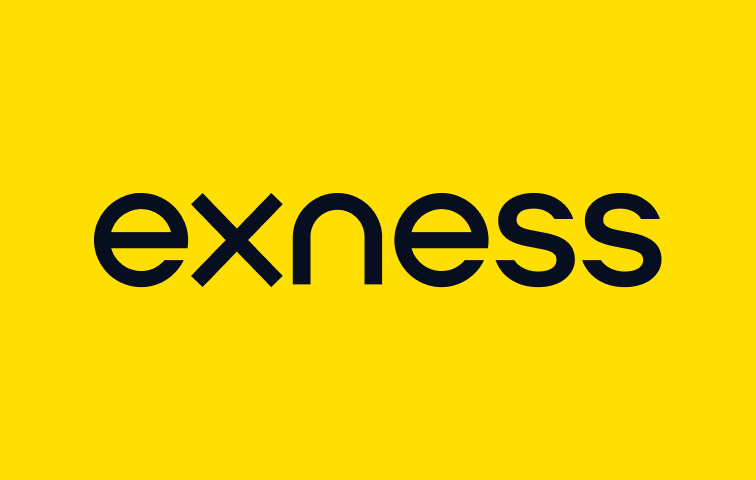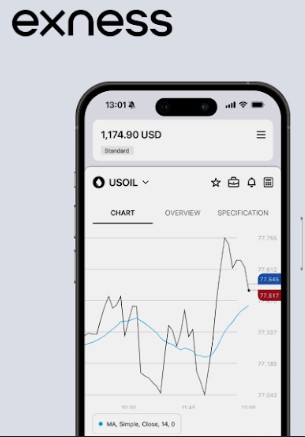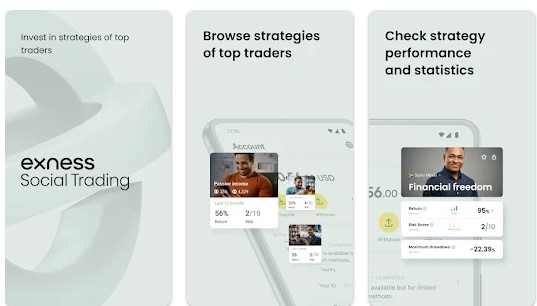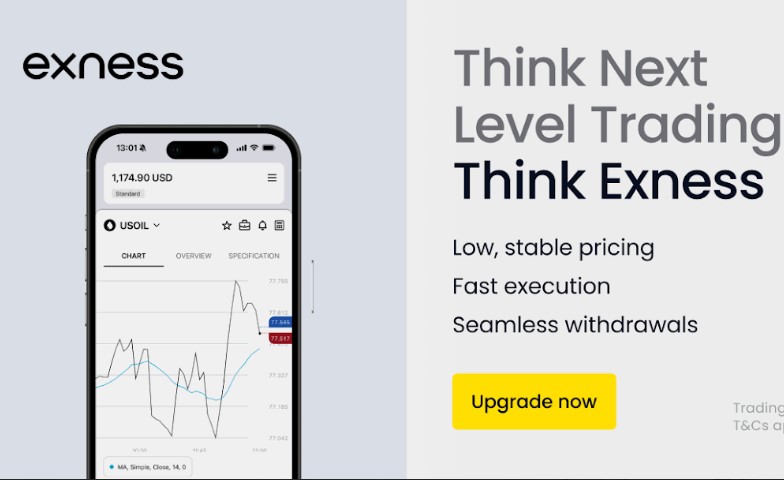
13 minute read
Is Exness go legal in india 2025
Is Exness go legal in india? The online trading platform Exness has gained popularity over the years, but its legal standing within the Indian financial landscape remains a crucial topic of discussion. Understanding the regulatory framework governing forex trading in India, alongside Exness’s compliance with these regulations, is essential for anyone looking to engage with this platform. In this article, we'll delve deep into the various aspects surrounding Exness's operations in India, including its legality, user experiences, and the future of online trading in the country.
Regulatory Framework Surrounding Exness in India
The first step in assessing whether Exness is legal in India involves examining the regulatory environment guiding forex trading in the country.

📌📌📌 Open Exness An Account ✅
💥💥💥Visit Website Exness Official ✅
When it comes to forex trading, India follows stringent guidelines set by the Reserve Bank of India (RBI) and the Securities and Exchange Board of India (SEBI). These regulations are designed to protect investors from market volatility and fraud while maintaining the integrity of the financial system.
The RBI primarily governs the forex markets, focusing on foreign exchange management and ensuring that trades comply with international standards. On the other hand, SEBI oversees securities and derivatives trading, acting as a watchdog to ensure fair practices.
Both bodies have established specific rules regarding who can operate within the forex market and how trades can be executed. For example, only certain currency pairs are permissible for trading, and all transactions must adhere to the limits imposed on foreign investments. This regulatory framework is crucial in determining if platforms like Exness can legally facilitate forex trading in India.
Understanding the Role of RBI and SEBI
The Reserve Bank of India plays a pivotal role in shaping the country's forex trading policies. By controlling the Foreign Exchange Management Act (FEMA), the RBI regulates capital flows and ensures compliance with international treaties.
On the other hand, SEBI's mandate entails protecting investors' interests while promoting fair trading practices. They oversee brokers, set rules about margin trading, and license entities operating in the securities markets. The interplay between these two authorities creates a comprehensive regulatory environment that seeks to safeguard traders and maintain market stability.
Legal Trade Instruments in India
Another critical aspect of understanding the regulatory landscape is recognizing what instruments are legally available for trading. In India, only specific currency pairs are allowed for forex trading, and trading should occur through recognized exchanges or licensed brokers. The restrictions aim to eliminate speculative practices that could destabilize the financial markets.
Given these limitations, platforms like Exness face challenges in aligning their offerings with India's regulatory environment. Therefore, it is vital for traders to be aware of which currency pairs they can trade legally within the Indian context, avoiding potential pitfalls that could lead to legal repercussions.
International Regulations Versus Local Laws
Exness, being an internationally regulated broker, complies with various global standards. However, these international regulations may not necessarily meet the local laws established in India.

For instance, while Exness operates under multiple licenses from reputable regulatory bodies like the Financial Conduct Authority (FCA) in the UK and the Cyprus Securities and Exchange Commission (CySEC), Indian laws dictate strict parameters for forex trading. This discrepancy raises important questions about Exness's operations and their ability to cater to the Indian market without contravening local laws.
Is Exness Compliant with Indian Law?
After analyzing the regulatory framework, the next logical question is: Is Exness compliant with Indian law? Compliance is a multifaceted issue that requires scrutiny of Exness’s operational practices in relation to RBI and SEBI guidelines.
To determine compliance, a trader must evaluate Exness's offerings against Indian forex regulations. As mentioned earlier, the RBI specifies which currency pairs may be traded, and only recognized brokers can facilitate trading. If Exness offers instruments that fall outside these parameters, it may indeed breach local regulations.
Key Compliance Issues
One of the primary compliance issues revolves around the types of accounts offered by Exness. For example, if Exness provides leverage beyond what is permitted under Indian laws, this could create serious implications for both the users and the platform itself. Furthermore, any advertising or promotional activities that encourage trading in unauthorized instruments could be flagged by regulators.
Moreover, the transparency of Exness's operations must also be scrutinized. Any discrepancies or lack of clarity concerning fees, withdrawal processes, or trade executions could raise red flags. Given the importance of trust and reliability in trading, non-compliance with Indian regulations can severely tarnish the reputation of a trading platform.
The Importance of Licensing
Licensing is a cornerstone of legitimacy when assessing the compliance of any trading platform. Exness, while holding several international licenses, lacks direct authorization from Indian regulatory bodies like the RBI or SEBI. This absence of local endorsement is a significant factor in determining its legal standing.
Without local licensing, Exness can still offer its services to Indian traders; however, the risk involved remains. Traders must understand that engaging with an unregulated entity may expose them to risks such as fund mismanagement, poor customer service, and inadequate dispute resolution mechanisms.
Conclusion on Compliance
In conclusion, while Exness operates under multiple international licenses, its compliance with Indian law remains ambiguous. Traders must conduct thorough research before using this platform, ensuring they fully understand the associated risks and legality based upon local regulations.
The Impact of Forex Regulations on Exness in India
Forex regulations directly influence trading conditions, account types, and the overall experience for traders using platforms like Exness in India. Understanding the impact of these regulations is essential for any trader seeking to navigate this complex landscape.
The constraints imposed by Indian regulators affect everything from leverage ratios to the variety of trading instruments available. Consequently, Exness may need to modify its offerings to align with these regulations, impacting user experience and accessibility.
Stricter Leverage Limits
One of the most significant impacts of forex regulations in India is the limitation on leverage levels. While international brokers like Exness offer high leverage ratios, Indian regulations cap these ratios considerably for retail traders. This limitation can significantly alter trading strategies, as higher leverage can amplify potential gains but likewise magnify losses.
For traders accustomed to the more liberal leverage settings provided by Exness abroad, adapting to Indian regulations may require a shift in mindset and strategy. It is crucial for Indian traders to recognize that lower leverage means reduced risk exposure, but it may also limit profit potential.

Restricted Currency Pairs
Indian regulations permit trading in selected currency pairs, creating another layer of complexity for platforms like Exness. This restriction means that traders may not access the full range of options typically available through international trading platforms.
The focus on limited currency pairs aims to enhance market stability and reduce speculative trading, yet it can also frustrate traders seeking diversification in their portfolios. Understanding these restrictions is vital for making informed decisions about trading strategies.
The Effect on Customer Support and Education
Forex regulations can also impact the level of customer support and educational resources provided by brokers like Exness. Local regulations often necessitate additional training and transparency requirements, compelling brokers to invest in educational initiatives for traders.
While this investment can enhance trader knowledge and skills, it may also cause brokers to concentrate their efforts on markets where regulatory environments are less restrictive. Consequently, traders in India may find themselves at a disadvantage compared to those in other jurisdictions that benefit from better resources and support.
How to Verify the Legitimacy of Exness in India
Verifying the legitimacy of a trading platform like Exness is paramount for any trader considering entering the forex market in India. Given the complexities surrounding regulatory compliance, it's essential to approach this task with diligence and careful consideration.
Several steps can help traders ascertain Exness's legitimacy, from researching regulatory status to connecting with current users. This process is indispensable for making informed decisions and safeguarding one’s financial investments.
Checking Regulatory Status
The first step toward verifying legitimacy involves checking Exness's regulatory status. Traders should visit Exness's official website and review the licenses held by the platform. Identifying the regulatory bodies overseeing its operations provides critical insights into its compliance and accountability.
However, the absence of any direct licensing from Indian authorities poses challenges. Traders should remain cautious and consider the implications of trading with an unlicensed broker in India. Engaging with reputable forums and communities dedicated to forex trading can also shed light on the credibility of Exness.
Researching User Reviews
User-generated content can offer invaluable insights into Exness's legitimacy. Reading reviews and testimonials from existing users will provide perspectives on the platform's services, payment processes, and overall reliability.
Investigating online forums and social media platforms can yield rich information regarding traders' experiences. It is wise to look for recurring themes in user feedback, whether positive or negative, as these patterns can signal the quality and trustworthiness of the platform.
Consulting Industry Experts
Industry experts can serve as reliable sources of information regarding Exness's legitimacy. Engaging with financial advisors or seasoned traders can deepen one's understanding of the platform's strengths and weaknesses.
Forums dedicated to forex trading often feature discussions led by experienced professionals who share their insights on various platforms, including Exness. Seeking expert opinions can help reinforce confidence in one's decision-making process.
User Experiences: Trading with Exness in India
User experiences play a pivotal role in evaluating the practicality and effectiveness of trading with Exness in India. Exploring firsthand accounts from traders can illuminate the upsides and downsides of utilizing this platform.
While many traders may have had positive experiences with Exness, others might have encountered challenges that warrant attention. Understanding these collective experiences can inform potential users about what to expect and how to navigate the trading landscape.
Positive Aspects of Trading with Exness
Traders often highlight various benefits when discussing their time with Exness. Notably, the platform's user-friendly interface allows both beginners and experienced traders to navigate the trading space seamlessly.
Additionally, many users appreciate the range of trading tools and features available, such as advanced charting capabilities and analytical resources. These functionalities enable traders to make informed decisions and execute effective strategies.
Furthermore, Exness's strong commitment to customer service, including responsive chat support and extensive educational materials, contributes to positive user experiences. Many users report feeling supported throughout their trading journey, underscoring the importance of reliable customer assistance in fostering confidence.
Challenges Faced by Users
Despite the aforementioned positives, some traders have shared challenges during their experiences with Exness. A common concern relates to withdrawal processes, as some users report delays or complications when trying to access their funds. Such issues can breed frustration, particularly if traders depend on timely withdrawals for their financial needs.
Another challenge faced by users is the platform's limited availability of trading instruments due to Indian regulations. While Exness boasts a wide selection of currency pairs globally, Indian traders may find themselves constrained by local laws, impacting their trading options and strategies.
Additionally, some users have voiced concerns regarding the adequacy of educational resources tailored specifically to the Indian market. Though Exness offers robust general materials, the lack of localized content could hinder traders who require region-specific guidance.
Insights from Community Feedback
Community feedback serves as a valuable asset for traders evaluating Exness. Through interactions in online forums and social media groups, traders can gather insights from a diverse range of perspectives and experiences.
Such community-driven discussions not only illuminate individual experiences but also provide broader trends and potential pitfalls to watch out for. By engaging in dialogue with fellow traders, individuals can share strategies, tips, and recommendations, ultimately enhancing their trading journey
Government Stance on Exness and Online Trading Platforms
The Indian government has positioned itself cautiously toward online trading platforms like Exness. With the rise of digital trading solutions, regulators aim to strike a balance between encouraging financial innovation and protecting investors.
Understanding the government's stance on these platforms can provide traders with insights into the regulatory landscape and its potential implications for their trading activities.
Promoting Limited Investment Opportunities
The Indian government’s cautious approach is rooted in its desire to mitigate risks associated with speculative trading. By limiting the scope of trading instruments and imposing strict guidelines, authorities seek to promote responsible trading practices.
This regulatory outlook may prevent platforms like Exness from fully unleashing their offerings within India, reflecting the government's intention to protect investors from extreme volatility and market manipulation.
Encouraging Financial Literacy
Amidst the regulations, the government has made strides toward promoting financial literacy and education. Initiatives aimed at educating individuals about the financial markets, investment strategies, and risk management are growing in prominence.
Such efforts align with the goals of platforms like Exness, which emphasize the importance of trader education. By fostering a well-informed investor base, the government hopes to cultivate a stable trading environment conducive to long-term growth.
Monitoring and Compliance Initiatives
The Indian government's ongoing monitoring of online trading platforms signifies its commitment to maintaining market integrity. Authorities routinely assess compliance with regulations, conducting audits and investigations when necessary.
By ensuring that platforms like Exness adhere to local guidelines, regulators aim to instill public confidence in the trading environment. This transparency helps mitigate fraudulent practices and protects investor interests.
Future Prospects for Exness's Legal Standing in India
Looking ahead, the future prospects for Exness's legal standing in India hinge on several critical factors. As the forex market continues to evolve, so too will the regulatory landscape, potentially influencing Exness's operations in the country.
Understanding these prospects can inform traders about the potential trajectory of online trading in India and the implications for platforms like Exness.
Evolving Regulatory Landscape
The dynamic nature of financial regulations suggests that the Indian government may revisit and revise its existing forex trading guidelines. This adaptability opens the door for platforms like Exness to explore new opportunities and possibly align their offerings more closely with local requirements.
If regulations were to ease, Exness could expand its product suite and attract a broader audience of Indian traders looking for diverse trading options.
Growing Acceptance of Online Trading
With an increasing number of individuals turning to online trading for wealth creation, the societal perception of platforms like Exness may shift positively. As more people recognize the potential of forex trading, the demand for reliable and compliant brokers could rise.
This growing acceptance may prompt regulators to adopt a more favorable outlook toward online trading platforms, facilitating a more open environment for firms like Exness to operate legally.
Technological Advancements and Adaptations
As technology advances, trading platforms are likely to adapt to emerging trends and user preferences. Exness's ability to innovate and integrate new features into its platform will be critical in maintaining relevance within the competitive trading landscape.
Moreover, enhanced security measures and regulatory compliance protocols may strengthen Exness's position, allowing it to navigate India's complex legal environment more effectively.
Conclusion
The question of Is Exness go legal in india is intricate, revolving around the regulatory framework, compliance challenges, user experiences, and evolving governmental stances toward online trading platforms.
✳️ Read more:
Best EXNESS Trading Strategies For Beginners
How to Trade Forex on EXNESS For Beginners
How to Trade Crypto on EXNESS For Beginners
How to Trade Gold on EXNESS For Beginners










